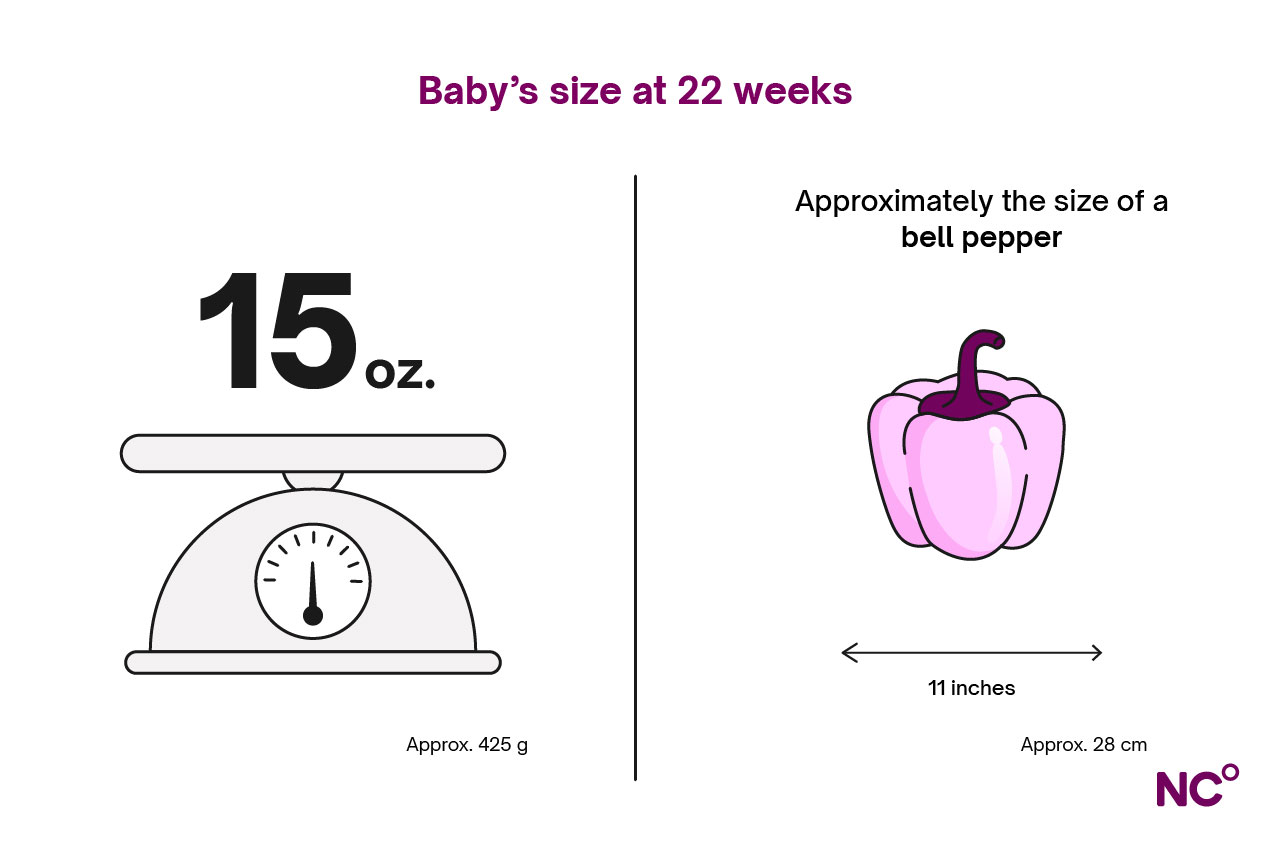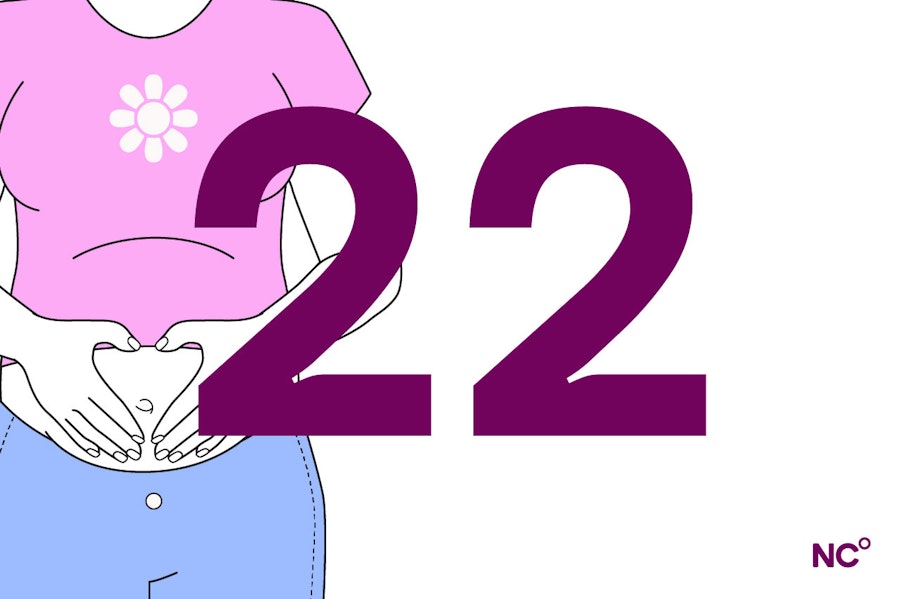22 Weeks pregnant: Symptoms, baby development and tips
Follows NC° Editorial Policy
At Natural Cycles, our mission is to empower you with the knowledge you need to take charge of your health. At Cycle Matters, we create fact-checked, expert-written content that tackles these topics in a compassionate and accessible way. Read more...
Key takeaways:
- Changes to your feet during pregnancy are common, and while swelling resolves postpartum, some changes to the size and shape of your feet can be permanent
- Your baby is growing eyelashes and eyebrows this week alongside the lanugo hair covering their whole body
- It’s OK to say no – allowing others to touch your stomach, and sharing information about your fertility, pregnancy, and breastfeeding plans are decisions that are completely up to you
It’s pregnancy week 22! In this week’s article, we will talk about what to do about swelling and growing feet, as well as how to manage unwelcome comments and unwanted touching from those around you who might see your growing stomach and learn about your pregnancy. We will check on your baby and cover a couple pregnancy symptoms you might notice this week, like acne and spider veins.
Your body at week 22
Growing feet
Are your shoes feeling tight or are previously comfortable shoes making your feet achy or giving you blisters? You are not imagining things – most likely your feet are changing during pregnancy!
A combination of weight gain and the muscle-relaxing hormone relaxin can put new stresses on the musculoskeletal system leading to changes in the foot structure and shape [1]. Changes in the way that you walk during pregnancy also contribute to musculoskeletal changes. Increases in foot length, width, and volume during pregnancy are all common. For some, changes in foot size like those that result from swelling (edema) can resolve postpartum. However, other changes can remain after pregnancy.
Proper-fitting shoes enable you to exercise while supporting your pelvis, hips, and lower back. Keep in mind, though, that your feet can continue to change through the coming weeks and months. Consider shoes and sandals that are adjustable, like those with elastic or adjustable straps and laces, in order to accommodate any changes that might occur throughout the duration of your pregnancy.
Coping with tummy touchers
As your baby grows, your expanding stomach will likely become more and more noticeable to those around you. This can invite unwanted belly-touching from family, friends, or even complete strangers. Surprisingly as this might seem, preparing for any unwanted advances can help you know what to do to feel more comfortable interacting and responding to outreaching hands.
If someone asks if they can touch your stomach, and you do not want them them to, know that it is perfectly OK to respond with “actually, I don’t want you to touch my belly”, “I’m sorry, I don’t feel comfortable having my stomach touched”, or a simple “no”. If you don’t feel comfortable or confident being direct, you can try one these:
- “Sorry, but rubbing my belly upsets my stomach”
- “My skin is actually really sensitive”
- “The baby responds to movement and they’re resting right now”
- “I’m sorry, but my doctor (or healthcare provider) doesn’t want anyone touching my stomach”
While people may mean well, it is important for you to set boundaries and feel comfortable. Remember that you don’t owe anyone, even close friends or family, an explanation.
Your baby’s development at 22 weeks
At 22 weeks, your baby looks a lot like a newborn, just smaller! They’re currently around 10 to 11 inches (25-28 centimeters) and weigh around 14 to 15.2 ounces (400 to 430 grams) [2]. Around the size of a bell pepper, they’re pretty wrinkly but gaining weight every day to fill out their skin.

Eyelashes and eyebrows are beginning to appear on your baby's face, in addition to the thin, soft hair called lanugo that covers their entire body [3]. Your baby’s first poop, called meconium, is also starting to form in their intestines.
Pregnancy symptoms in week 22
Spider veins
Have you noticed thin red, blue or purple lines just under the surface of your skin? These are likely spider veins, or telangiectasia. Spider veins are small, damaged blood vessels that most commonly appear on the legs but can happen anywhere on the body, even the face [4]. Spider veins are rarely a serious health concern, but they can occasionally be painful.
Studies have suggested that spider veins develop as milder varicose veins, which we discussed in the week 18 pregnancy guide [4,5]. During pregnancy increased blood flow and pressure on your veins can weaken and damage the walls of blood vessels, especially small ones. These can cause them to swell (known as varicose veins) or even break, making them visible beneath the skin [5].
Spider veins can fade for some women postpartum. However, others might require additional treatments to minimize their appearance [6]. Because many are not advised during pregnancy, talk with your healthcare provider postpartum if you are interested in treating spider veins.
Acne
Acne is known to affect up to nearly half of women during pregnancy and breastfeeding, mostly in the second and third trimesters [7]. Though pregnancy acne has not been extensively researched, scientists believe that changes to your hormones, circulation, digestion, and immune system during pregnancy can all contribute to pregnancy acne. If you have already suffered from acne before pregnancy, it is possible that pregnancy can worsen or change the nature of your acne.
It is important to talk to your healthcare provider before treating your acne, as many ingredients are not recommended for those who are pregnant or breastfeeding. This includes over-the-counter skincare and acne medications, as well as prescribed treatments.
Swelling in hands, feet, and ankles
Edema, or mild swelling, is common during pregnancy as your body circulates and retains a greater volume of fluid. It is most commonly experienced in the feet and ankles, but can also affect your hands. Staying in one position for a long period of time, which slows fluid circulation, can contribute to swelling. Hand and foot exercises, avoiding shoes that are too tight, and regular exercise (if recommended during your pregnancy) can all improve fluid circulation and reduce swelling [8].
While gradual swelling in pregnancy is normal, particularly at the end of the day, a sudden increase in swelling could be a sign of preeclampsia. Preeclampsia is a serious condition relating to high blood pressure that requires immediate medical monitoring. If you suddenly notice your hands, feet or face are swollen, or if you experience a severe headache, vision problems, pain below your ribs, or nausea, contact your healthcare provider immediately [9].
Tips in week 22
- Check your rings: minor swelling in your hands can develop slowly, but it might take you by surprise when you find that you suddenly cannot remove rings or other jewelry! It’s a good idea to regularly check that you can easily remove your rings, or that they are still fitting comfortably, in order to prevent the need to cut them off later.
- Managing unwelcome comments and questions: as your pregnancy progresses, more friends, family, and acquaintances will notice that you are pregnant. While it is nice to have the extra support, it can also invite unwelcome, or even inappropriate, questions and comments on everything from your appearance to child-rearing, birth, and breastfeeding. It is always up to you to share, or not share, details or information about your pregnancy and plans. Speak with your partner if the comments or actions of friends or family make you uncomfortable so they can support you as situations arise in the future.
- Pelvic floor exercises: incorporating pelvic floor exercises in your daily routine is a safe and easy way to help with pregnancy symptoms like leaking pee, as well as prepare your body for labor and delivery.
- Avoiding common infections: during pregnancy, your immune system is compromised and you are more susceptible to germs like those that cause the flu or a cold. Remember to take simple steps to avoid getting sick, like washing your hands regularly with soap and water, avoiding people that are unwell, and making sure that your food is well-prepared. It’s also wise to avoid those leftovers that have been camping out in the fridge, or food that has been left sitting on the counter a bit too long.
- Invest in comfortable shoes: changes in your foot size and shape, swelling, and changes in how you walk might all require you to reevaluate your footwear. It might seem like a drag, but choosing the right shoes or investing in new shoes can actually help you stay healthier during your pregnancy by improving circulation and making exercise possible.
Following your pregnancy with Natural Cycles
If you enjoyed this article, did you know that NC° Follow Pregnancy offers weekly pregnancy guidance to support you throughout your pregnancy, all in an easy-to-use app? Symptom trackers and articles provide you the tools to care for your physical and mental health as you navigate your pregnancy and all the changes that come with it. And at the end of your pregnancy, NC° Postpartum is on-hand to guide you through this new stage of life with your baby. Why not check out Natural Cycles today?
Did you enjoy reading this article?
